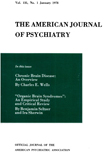Abstract
Research at the NIMH on the families of schizophrenics is broadened in this study to include the parents of child psychiatric patients. Previous studies in this program (5) have demonstrated that the families of young adult schizophrenics can be blindly differentiated from the families of young adult neurotics when criteria are used which emphasize form or style of thinking and focusing attention. In the present study we show that relationship disorders, rather than the thinking disorders which are so prominent in the families of the adult schizophrenics, are especially pertinent to the differentiation of families of autistic schizophrenic children from families of neurotic children.
The criteria for predicting autistic illness in an offspring from parental data were derived from the psychodynamic hypothesis that primary disruption and impairment in the child's relationship to parental figures is crucial in early autistic disorders. We have assumed that an infant's congenital incapacity can contribute to such relationship failure. Nevertheless, in this series of families it has been possible to distinguish blindly those parents who have autistic children from the manner in which they appear to rebuff, impair, and interfere with the very beginnings of any tender or nurturant relationship, as judged from projective test protocols.
The parents of 20 autistic children were blindly differentiated at a statistically significant level of accuracy from sociologically matched parents of 20 neurotic children. The parents of the neurotic children, half withdrawn and half aggressive, acting-out, were in turn successfully differentiated into these two groups on the basis of the parental projective tests.
This research suggests the importance of considering mental disorders, including schizophrenia, both in childhood and later, as heterogeneous, and studying the links between definable varieties of individual mental disorder and definable varieties of family patterns.
Criteria applicable to TAT data for distinguishing the parents of the three varieties of child patients and the parents of young adult schizophrenics were described. The disaffiliative tendencies of the parents of the autistic young children were especially significant, while the parents of patients whose schizophrenia did not become overt until late adolescence or young adulthood appeared to let relationships develop but distorted and impaired the focusing of attention and the acquisition of clear meanings. The parents of the acting-out children in this series were active and energetic in their relationships, though often with various disturbed moods and impulses, and were relatively well-defined and clear in their percepts. Parents of a group of withdrawn neurotic children showed especially sadness, together with serious strivings to maintain relationships. The behavior of the offspring in all of these families appeared "logical" and developmentally meaningful in the sense that the forms of behavior seen in the patient-offspring would fit in with major formal transactional patterns seen in the parents.
The formulations made in this paper are applicable, we wish to stress, only to those varieties of patients and families which we have thus far studied; we do not regard these findings as applicable, for example, to the families of childhood schizophrenics who have gross neurological impairment (18).
These formulations generated additional hypotheses which were tested through blind ratings of Rorschach data from these parents. It was found that the frequency of thinking disorders, genetic-level of psychological differentiation, and frequency of expressions of over-all and initial hostile affect found in the four groups of parents were in predicted directions.
The data presented here support a developmental theory of familial contributions to ego impairment which is being evolved in the family studies at the NIMH. The present data especially emphasize parental styles of thinking and relating as a crucial co-determinant—other experiential and innate factors are also co-determinants—of enduring patterns of behavior in offspring.

